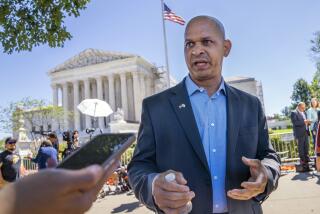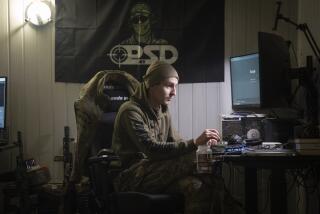CRISIS IN THE KREMLIN : Tide Turned as Tank Unit Joined People : Military: Yeltsin persuaded soldiers to switch sides. That helped doom the conservative coup.
- Share via
MOSCOW — Awakened before dawn Monday morning and ordered to get his men into tanks and head toward the Soviet capital, Lt. Nikolai Kotlerov had no idea he was being sent to enforce a reactionary coup d’etat.
“When we got to Moscow, people walked up to us and asked, ‘You’re not going to shoot, are you?’ ” recalled Kotlerov, the platoon commander from the elite Tamanskaya Tank Division.
“It was shocking to us,” he said, “because of course we didn’t plan to shoot our own people. We thought they were just asking us stupid questions, but then they explained what was going on in our country.”
After his tank had joined a long row of armored vehicles posed menacingly along the Moscow River embankment near the Russian Federation Parliament building, Kotlerov was approached by a Russian government official who entreated him to enter the Parliament building and speak with Boris N. Yeltsin, the besieged Russian president.
“I agreed, and my commander did not prohibit me, so I became the ambassador for my unit,” said Kotlerov, a slight 23-year-old with curly dark hair and hazel eyes who grew up on a collective farm near Kursk in central Russia.
Yeltsin appealed to the soldier for his help, telling him his duty was to protect his people and his government--not an illegal putsch.
Easily won over, Kotlerov returned to his unit and, in turn, persuaded his commanding officer, Maj. Sergei Yevdokimov, to meet with Russian Federation officials.
“Half an hour later, Sergei Yevdokimov swore his allegiance to the Russian government, which decided to station his 10 tanks around the Parliament to defend the Russian leadership,” according to Irek Mortazin, the official who invited Kotlerov into the Parliament.
By breaking ranks to side with the Russian government, this small tank unit inspired tens of thousands of Muscovites in their resistance and helped put down the conservative putsch, which had threatened to erase the democratic reforms achieved over the last six years.
Yeltsin said Wednesday that the unit from the Tamanskaya Tank Division and other military groups across Russia that sided with his government had made it “impossible” for the Emergency Committee, created by the conservative coup plotters, to “isolate” or “intern” the Russian leadership.
Although there were many defections to Yeltsin’s side by military groups, the Tamanskaya tank crews--part of a showcase division southwest of Moscow that foreign dignitaries frequently visit--won the spotlight because they were the first to break ranks and defend the very heart of the resistance, the Russian Federation Parliament building.
They became instant heroes for the masses of people who kept a vigil outside the Parliament despite warnings that other troops were preparing to storm the area.
“They played a key role because they prove that all the military is not united behind the junta members,” said Valentin I. Sidorov, 57, an engineer. “Without their support, the situation could have been much worse--perhaps the junta members would have stormed the Parliament.”
The 10 tanks from the Tamanskaya division as well as about the same number of armored personnel carriers, whose crews had also sworn allegiance to Yeltsin’s government, were stationed in a ring around the Parliament building.
“It’s a tremendous moral support to have them here,” said Yuri Treger, 56, a chemistry professor keeping vigil at the Parliament building. “We see that we have military forces who know that their duty is to serve the people and not (Defense Minister Dmitri T.) Yazov.”
“If we did not have military strength behind us, it would have been very difficult to hold up,” said Vladimir Nikiforov, 24, the leader of one of the unarmed volunteer defense units at the Parliament building. “They’ve shown us that they are our brothers and they will not go against us.”
The soldiers--who were lavished with food, flowers and Russian national flags by grateful Muscovites--seemed sheepish about all the attention. Often they stayed inside their tanks, away from the public eye.
“People treat me as if I did some very brave act,” Kotlerov said. “They treat me like a hero, but I didn’t do anything special.
“I’m a Russian myself. How could I go against my own people?”
As the coup collapsed Wednesday, all armored vehicles were ordered to leave Moscow and return to their garrisons, but the Russian government decided that the Tamanskaya tanks would remain in place until tension eased, according to Mortazin, assistant to Deputy Defense Minister Maj. Vladimir Lopatin. Mortazin, who was an officer himself until a year ago, said there were countless stories of military units that helped thwart the conservative takeover.
“There are thousands of officers like Yevdokimov in the country,” Mortazin said.
At first, most of the bewildered soldiers who found themselves being used as pawns for an illegal coup continued to obey the orders of the junta. But gradually, starting with the Tamanskaya unit, more and more declared their loyalty to democratically elected officials.
The junta’s inability to command the army despite Yazov’s position on the coup’s Emergency Committee was a major reason for the coup’s failure, according to Oleg D. Kalugin, a former general in the KGB security and intelligence agency and a member of the Congress of People’s Deputies, the national Parliament.
“Hundreds of (KGB) officers are on the side of Yeltsin and are all ready to give an oath to him,” Kalugin said.
A Russian legislator, Mikhail Dmitriyev, agreed that the military was key to the downfall of the coup. “The Emergency Committee is afraid to rely on military force because the attitude of soldiers is mixed,” he said. “Nobody knows when soldiers will shoot their commanding officers.”
The decisions by military and KGB officers to defy orders and stand behind Yeltsin and other elected officials were especially striking in view of the Communist Party’s total domination of the armed forces throughout its 73 years of rule.
Not since the Russian Revolution, when czarist soldiers refused to obey their officers, has discipline in the army been so seriously violated. For decades, subordination was enforced with an iron hand and servicemen obeyed unquestioningly. Purges of officers under dictator Josef Stalin reinforced in every soldier’s mind the lesson that rebellion means death.
As a result of Soviet President Mikhail S. Gorbachev’s reforms, many military personnel have become political figures and started challenging the status quo. Several of the prominent figures in Yeltsin’s liberal government, including Vice President Alexander Rutskoi, are military officers.
“Although many of the generals are still obedient to the Communist Party, the majority of colonels and lieutenants are democratically minded,” Mortazin said.
As armored vehicles roared out of Moscow on Wednesday afternoon in one of the first signs that the coup was ending, a soldier on a tank crew that had enforced the ban on free broadcasts by guarding a radio station said he was remorseful that he had not played the same heroic role as his comrades from the Tamanskaya Tank Division.
“I would have liked to be defending Yeltsin too,” the freckle-faced soldier said as he ran to jump into his tank.
More to Read
Sign up for Essential California
The most important California stories and recommendations in your inbox every morning.
You may occasionally receive promotional content from the Los Angeles Times.













